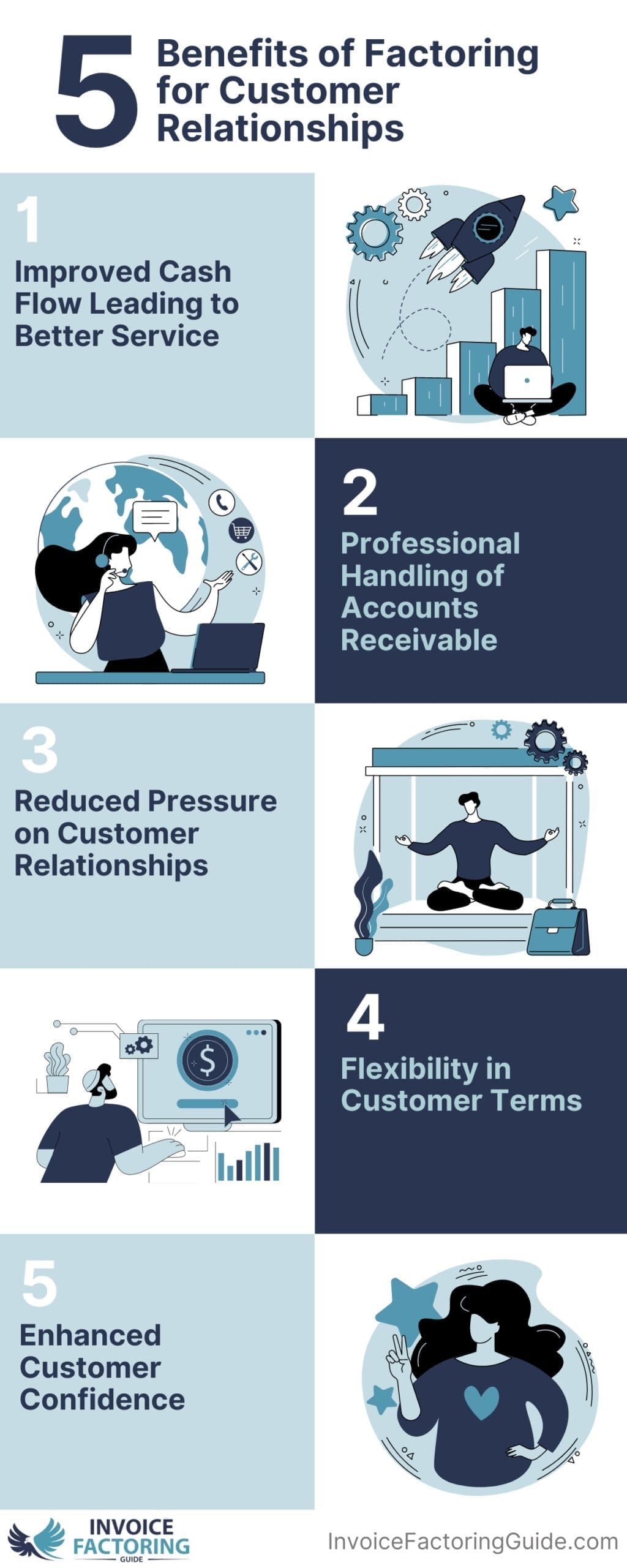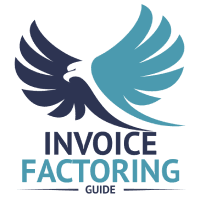
Customer service is not a department, it’s everyone’s job,” said leadership expert Kenneth H. Blanchard. Every interaction, whether it’s speaking with a sales rep, navigating an invoice, or receiving a product on time, shapes your customer’s perception. When cash flow is tight, these touchpoints can suffer, eroding trust and service quality.
That’s where invoice factoring becomes more than just a financial solution. By turning unpaid invoices into immediate working capital, it ensures you have the resources to maintain consistent service and strengthen client loyalty. Still, some business owners hesitate, wondering if using a factoring company could confuse or frustrate customers.
In this guide, we’ll break down the benefits and potential pitfalls of factoring from a customer relationship standpoint and share best practices to help you manage both effectively.
The Intersection of Factoring and Client Relations: A Primer
Invoice factoring is a financial solution that allows businesses to sell their unpaid invoices to a third party, known as a factoring company, in exchange for immediate cash. This can be particularly beneficial for businesses that need to improve cash flow without waiting the typical 30, 60, or even 90 days for their customers to pay. Factoring can provide the working capital necessary to cover day-to-day expenses, invest in growth, or take on new opportunities without taking on debt.
The Factoring Process
The process of factoring is relatively straightforward. Once a business has delivered goods or services and issued an invoice to their customer, they can submit that invoice to a factoring company. The factoring company will then advance a percentage of the invoice’s value—typically 60 to 95 percent—to the business. When the customer pays the invoice, the factoring company will remit the remaining balance, minus their fee, to the business.
Key Times When Customers Become Aware of Factoring
Since the factoring company takes over the collection of the invoice, there are a few points in the process where customers might become aware of the factoring agreement or engage with the factoring company directly.
Notification of Assignment
When a business enters into a factoring agreement, the customer typically receives a formal notification that their invoice has been assigned to a factoring company. This is a standard procedure and informs the customer that payments should be made directly to the factoring company. While this can raise questions, it’s often seen as a professional and organized approach to handling accounts receivable, much like what happens when a business outsources its receivables processes. You can use this notice as an opportunity to proactively manage customer perceptions of factoring by highlighting the benefits of factoring for customers.
Because some businesses prefer to factor a little more quietly, some factoring companies now offer non-notification factoring. In these cases, the factoring company may not send out a notice of assignment (NOA), or they may do so but use the business’s branding and information rather than their own to indicate any changes.
Communication During Collection
The factoring company may reach out to the customer to confirm the invoice details or to follow up on payment. It’s important to note that reputable factoring companies handle these interactions with professionalism, ensuring that the customer experience remains positive.
Handling of Disputes
In some cases, if there’s a dispute over the invoice, the customer might need to interact with the factoring company to resolve the issue. Again, a good factoring company will work closely with both the business and the customer to address any concerns promptly and fairly.
The Benefits of Factoring for Customer Relationships

At first glance, businesses might worry that involving a third party in their invoicing process could strain customer relationships. However, when handled correctly, factoring can actually enhance these relationships in several ways.
1. Improved Cash Flow Leads to Better Service
By securing immediate funds through factoring, businesses can maintain smooth operations without the stress of cash flow shortages. This means they can continue delivering products or services to their customers without delay. When customers see that your business is stable and reliable, their trust and confidence in your company naturally increase.
2. Professional Handling of Accounts Receivable
Factoring companies are experts in managing collections and accounts receivable. This professionalism can lead to more structured and timely communications with your customers. Instead of worrying about chasing payments, your customers receive clear instructions on where and how to make payments, reducing the chances of miscommunication or late payments.
3. Reduced Pressure on Customer Relationships
When a business owner isn’t bogged down by the stress of unpaid invoices, they can focus more on building strong, positive relationships with their customers. Factoring as a tool for customer satisfaction allows the business to separate financial concerns from customer interactions, leading to more amicable and focused discussions about future projects or repeat business.
4. Flexibility in Customer Terms
With the financial support provided by factoring, businesses can offer more flexible payment terms to their customers. For example, they might be able to extend net 60 or even net 90 terms, giving customers more time to pay without negatively impacting the business’s cash flow. This added flexibility can make your business more attractive to customers, build relationships with factoring, and lead to stronger customer loyalty.
5. Enhanced Customer Confidence
When customers are aware that a business is financially sound and has the backing of a factoring company, they may feel more confident in the long-term viability of the business. This confidence can translate into repeat business and stronger factoring, and customer loyalty. Additionally, the consistent and professional approach to invoicing can enhance the perception of your business as a well-managed and reliable partner.
Best Practices When Factoring for Customer Relationships
Successfully integrating factoring into your business operations while maintaining strong customer relationships requires thoughtful planning and communication. Below, we’ll cover some best practices to ensure that your factoring arrangement benefits both your business and your clients.
Choose the Right Factoring Partner
Selecting a reputable factoring company is crucial. Businesses in Texas can benefit from working with factoring companies in Texas that understand the regional market dynamics and prioritize customer-focused solutions, ensuring seamless integration with your operations. Look for a partner with a track record of professionalism, excellent customer service, and experience in your industry. The right factoring company will understand the nuances of your business and work seamlessly with your customers, ensuring that interactions are positive and professional. If you’d like to be matched with a reputable factoring company at no charge to you, let us know.
Communicate Transparently with Customers
Transparency is key when introducing a factoring arrangement. Inform your customers about the change in advance and explain how it will benefit them—such as providing more flexible payment terms or ensuring the stability of your operations. Clear, upfront communication strategies for factoring help prevent misunderstandings and reassure customers that the change is in their best interest. It’s also essential to train your team so that they’re knowledgeable and prepared when addressing concerns about factoring with customers.
Maintain Direct Relationships with Customers
While the factoring company will handle the collections process, it’s important to continue nurturing your direct relationships with key customers. Keep the lines of communication open and ensure they know you’re still their primary point of contact for any business-related discussions. This approach helps maintain trust and ensures that any concerns can be addressed promptly.
Set Expectations and Monitor Performance
Work closely with your factoring company to set expectations regarding customer interactions. Ensure that they understand your company’s values and the importance of maintaining a positive customer experience. Regularly monitor the factoring company’s performance, including factoring feedback and customer improvement. This allows you to step in if necessary and make adjustments to the process.
Resolve Disputes Quickly and Fairly
Disputes may arise from time to time, whether related to invoice discrepancies or service issues. When this happens, it’s important to act swiftly to resolve the matter in a way that satisfies both the customer and the factoring company. Proactively managing disputes not only prevents damage to customer relationships but also reinforces your commitment to excellent service.
Leverage Factoring to Offer Better Terms

Use the financial flexibility provided by factoring to offer more attractive terms to your customers. Whether it’s extending payment deadlines or offering early payment discounts, these gestures can enhance your value proposition and strengthen customer loyalty. Just ensure that any new terms are clearly communicated and agreed upon to avoid confusion.
Monitor Customer Satisfaction Regularly
After implementing factoring, keep a close eye on customer satisfaction. Regular check-ins, surveys, or informal conversations can provide valuable insights into how customers perceive the new arrangement. Use this feedback to make any necessary adjustments and to reinforce positive aspects of the relationship.
Improve Your Customer Relationships with Factoring
If you’re ready to leverage factoring for customer relationships and boost your cash flow at the same time, we’re happy to match you with a factoring company that understands your needs and has a strong customer satisfaction record. To get started, request a complimentary factoring quote.
FAQs on Factoring for Customer Relationships
Will my customers know if I use invoice factoring?
Yes, customers typically receive a notification when an invoice is assigned to a factoring company. This is standard practice and informs them that payments should be directed to the factoring company. Clear communication and a professional approach from the factoring company ensure that this does not negatively impact your customer relationships.
What are the benefits of factoring for customer relationships?
Factoring improves cash flow, allowing businesses to offer better service and flexible payment terms. It also reduces financial stress, enabling business owners to focus on building strong customer relationships. The professional handling of invoices by a reputable factoring company can enhance the overall customer experience, fostering trust and loyalty.
How can I maintain strong customer relationships while using factoring?
Maintain transparency by informing customers about the factoring arrangement and its benefits. Continue to nurture direct relationships with key clients and monitor the factoring company’s performance closely. Address any concerns or disputes quickly and fairly to ensure customer satisfaction remains high.
What should I tell my customers about factoring?
Explain that factoring is a financial tool that helps your business maintain stability and business reputation while continuing to deliver quality service. Reassure them that the process is seamless and that payments will now be directed to a trusted partner, the factoring company. Highlight any benefits, such as improved cash flow and flexible payment terms.
How do factoring companies interact with my customers?
Factoring companies typically interact with customers by handling invoice collections and payment processing. They may contact customers to confirm invoice details or follow up on payments. Reputable factoring companies manage these interactions professionally, ensuring that customer experience and relationships remain positive.
Can factoring help improve customer satisfaction?
Yes, factoring can improve customer satisfaction by providing your business with the financial stability needed to deliver consistent, reliable service. With factoring, you can offer more flexible payment terms, reduce the risk of delays in fulfilling orders, and maintain a strong, professional relationship with your customers.
How can I maintain trust with factoring in customer relationships?
Maintaining trust with factoring involves transparent communication with your customers. Clearly explain the benefits of factoring and how it supports your ability to provide consistent service. Reassure customers that their payments are handled professionally, and continue to nurture your direct relationships with them.
What should I know about invoice factoring and client relationships?
Invoice factoring can strengthen client relationships by improving cash flow, allowing you to meet customer needs more effectively. However, it’s crucial to select a reputable factoring partner and communicate openly with clients about the arrangement to ensure that the relationship remains positive and beneficial for both parties.
Why is transparency in factoring agreements important?
Transparency in factoring agreements is key to avoiding misunderstandings and building trust with your customers. By clearly outlining the terms of the agreement and keeping customers informed about how payments will be handled, you can ensure a smooth transition and maintain strong relationships.
How does customer service in factoring companies impact my business?
Customer service in factoring companies plays a significant role in maintaining your business’s reputation. A factoring company with strong customer service ensures that interactions with your customers are professional and positive, which helps in preserving the quality of your client relationships.
Why is client education on invoice factoring important?
Client education on invoice factoring is important to prevent confusion and build confidence in your business processes. By educating your clients on how factoring works and its benefits, you can foster a deeper understanding and ensure they feel comfortable with the arrangement.
How can I manage customer expectations with factoring?
Managing customer expectations with factoring involves setting clear guidelines about payment terms and how the factoring process will affect them. It’s important to communicate any changes upfront and address any concerns they might have to maintain a positive relationship.
What are some invoice factoring communication tips to avoid misunderstandings?
Key invoice factoring communication tips include being clear and transparent about the factoring process, notifying customers in advance about the change, and ensuring they know where to direct payments. Regular updates and open channels for questions can help prevent misunderstandings and maintain trust.
How can I avoid misunderstandings in factoring agreements?
Avoiding misunderstandings in factoring agreements starts with clear, detailed communication. Ensure that all terms are clearly explained to your customers and that they know what to expect in terms of payment processing. Regularly checking in with customers can also help address any concerns before they become issues.
What should I consider when negotiating factoring terms with customers?
When negotiating factoring terms with customers, consider their payment preferences and the impact of the agreement on your relationship. Be transparent about the terms and flexible where possible to ensure that the factoring arrangement benefits both parties and strengthens your client relationships.

About Invoice Factoring Guide
Related Insights
Get an instant funding estimate
Results are estimates based on the calculated rate and the total invoice amount provided.
Actual rates may vary.
Request a Factoring Rate Quote
PREFER TO TALK? Call us at 1-844-887-0300










